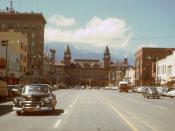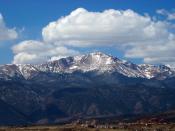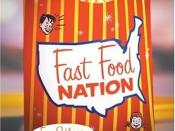Behind the Counter.
In his book "Fast Food Nation", Eric Schlosser shows how the fast food industry has infiltrated every corner of American Society. He tells of the disturbing reality that is American life today; almost every aspect of American life has been franchised or chained. Beginning in California and spreading throughout the entire country, Schlosser gives the history of the fast food industry and the evils and changes that developed with it.
In Chapter three, Schlosser begins by describing the view of Colorado Springs: its peaceful, serene, spectacular outlook from Gold Camp Road. It appears to be an all-American town with its independently owned businesses and layers of houses from many different historical eras. But then it's apparent what has happened in Colorado over the last twenty years as you come to the new spread out. The houses are the "architectural equivalent of fast food;" thousands of houses that are near identical line each street of each subdivision.
Academy Boulevard lies at the heart of this and resembles Harbor Boulevard in Anaheim, except newer, with its clusters of fast food joints repeating themselves every few miles. According to Schlosser, "the resemblance is hardly coincidental."
All the new housing expansions not only look like those in California, they are occupied with thousands of people from California. A whole way of life has been swapped from the West Coast to the Rockies. Schlosser says, "In many ways Colorado Springs today is what Los Angeles was fifty years ago..." It used to be a little tourist town inhabited by the wealthy and retired. But during the Great Depression many moved away and tourism dropped. A great economic opportunity then came about with the start of World War II. "Like Los Angeles, Colorado Springs soon became independent on military spending." The opening of...


